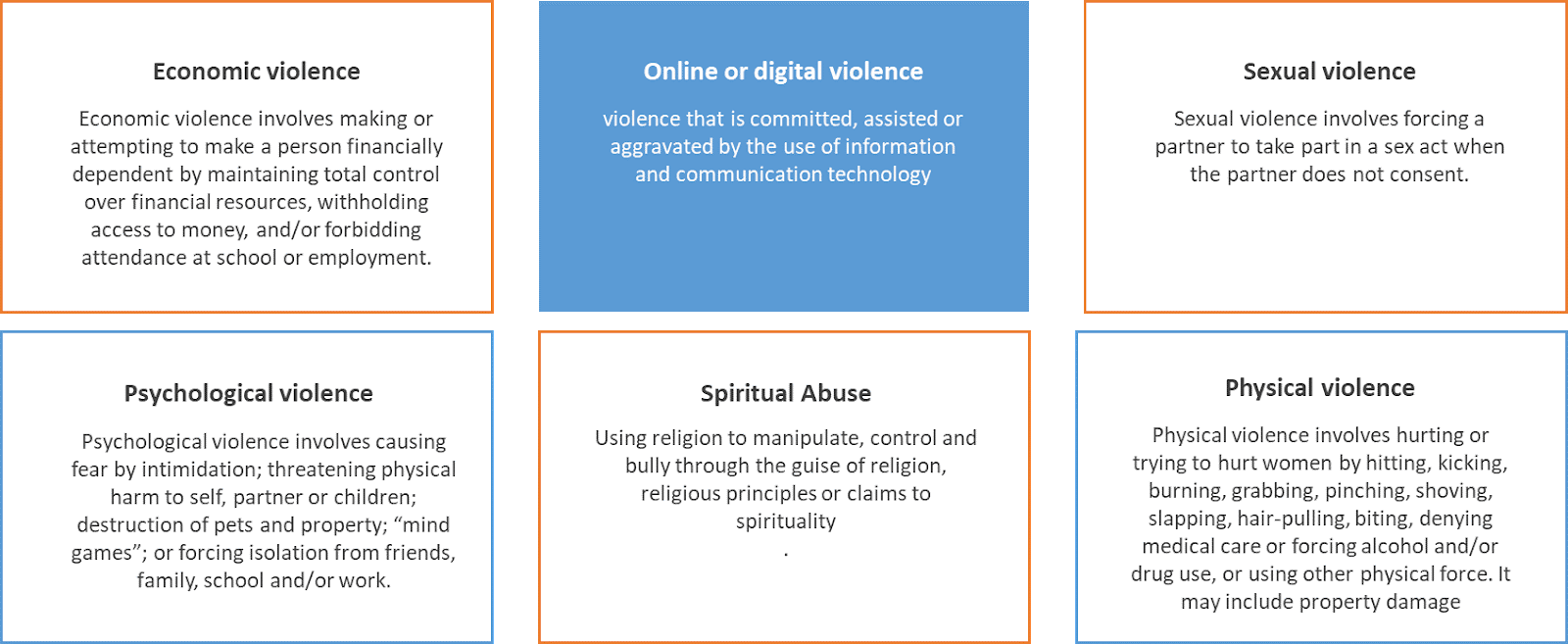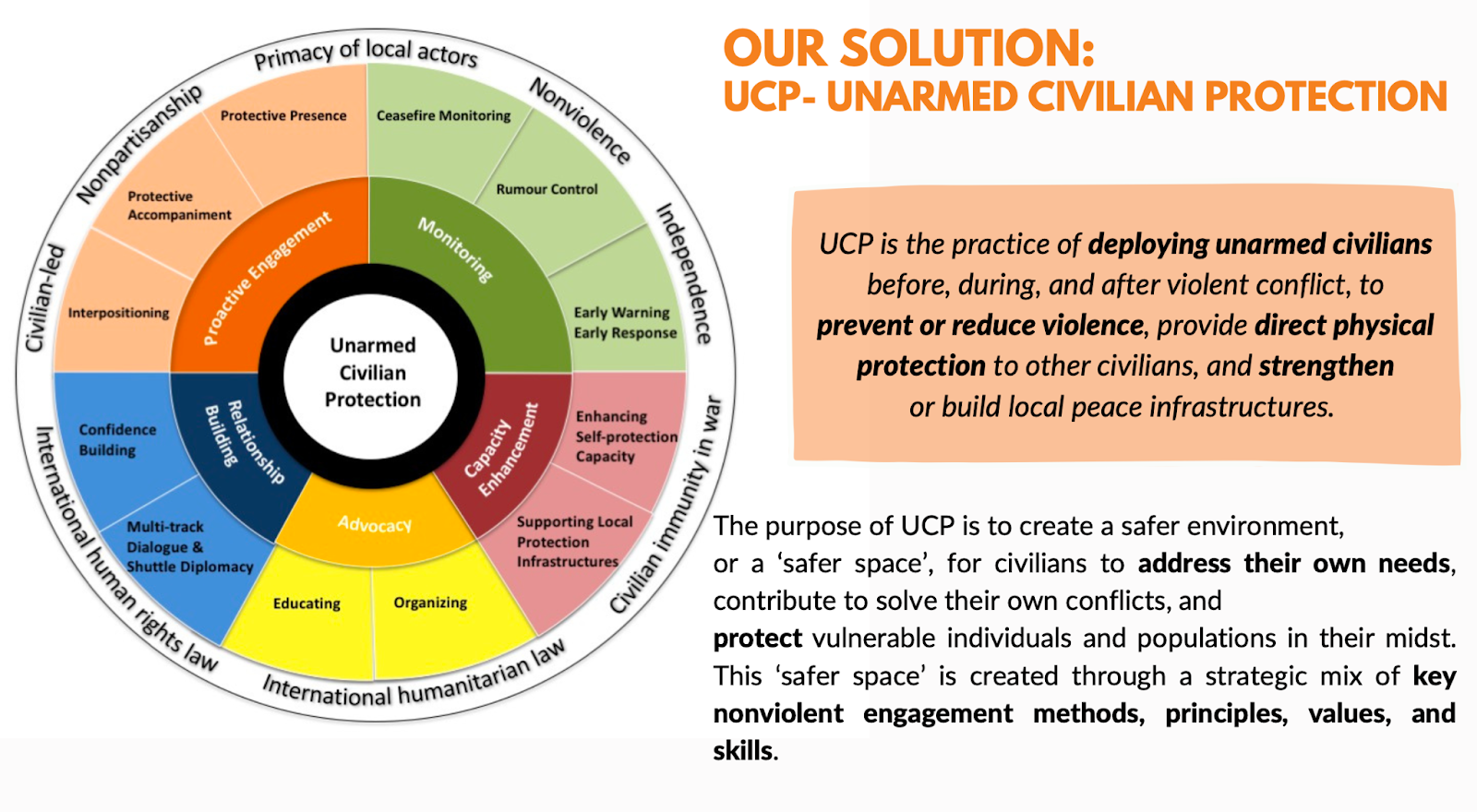Over 60 participants attended the Network’s Inclusivity-based Community of Practice meeting focused on protection of women and youth peacebuilders, held on Tuesday, January 25. The lack of protection for women and youth peacebuilders was identified through the Network’s 200+ consultations with women and youth-led and focused organizations as one of most common challenges their organizations are facing, with half of those surveyed in the meeting expressing they did not feel safe within their houses of worship and identifying issues around the political situations and unrest within their countries as their highest concern, followed by online-related violence targeting women and youth.
The focus of this meeting was to hear from the approaches of different types of trainers working in various sectors on how women and youth of faith peacebuilders can better protect themselves in their work. This meeting prioritized its focus on physical, online, mental and emotional protection. This meeting offered concrete takeaways for women and youth of faith peacebuilders to utilize in their daily lives.
-
- One in three women have been subjected to physical or sexual violence at least once in their life. Only 40% of women have sought help of any sort after experiencing violence.
- At least 1 in 8 young people in this room have reported sexual abuse.
- Homicide is the fourth leading cause of death for people 10-29 years of age.
The meeting kicked off with a framing of the discussion on key statistics around violence against women and youth, as well as explaining the various types of violence, led by the Network’s Senior Specialist on Inclusive Peace, Jessica Roland.
Types of Violence
Subsequently, attendees received a training on internal and external types of security, physical threats and attacks of violence that women and youth are at risk for. Trainer Jason Yabal, Project Coordinator for the European Union funded project ‘Strengthening the security and resilience of at-risk religious sites and communities offered practical steps of what to do in instances of active shooting situations. Jason also covered the types of threats faced by women and youth online and gave practical takeaways of what one can do to better protect oneself in the online space.
The SOAR project is funded and supported by the European Commission and is being delivered by Enhancing Faith Institutions (EFI), Network for Religious and Traditional Peacemakers, and the Architects’ Council of Europe (ACE). The main purpose of the project is to increase the awareness of, and capacity to respond to physical and human security threats to places of worship.
The meeting then heard from Marion Girard, Training Coordinator for Nonviolent Peaceforce and Kudzanai Mativirira, one of South Sudan’s field Programme Manager for Women Peace and Security and in charge of the Women Protection Teams project, on nonviolent civilian protection approaches to showcase another sector’s approach to protection.
Marion gave an overview of Nonviolent Peaceforce’s approach to training on unarmed civilian protection.
Following, Kudzanai gave a focused presentation on how this training is implemented on the ground. Kudzanai gave her experience of utilizing the training to build the capacity of women in South Sudan in order for the women to lead on protection issues in their community, as part of advancing the Women, Peace and Security agenda in South Sudan. Kudzanai gave practical examples of how they are advancing this work and the challenges they continue to face.
The meeting concluded with hearing from Ufra Mir, the first and only peace-psychologist from Kashmir & South-Asia, who is the founder of the International Center for Peace Psychology and Paigaam: A Message for Peace. Ufra’s session focused on the mental and emotional health and well-being as a form of protection for women and youth peacebuilders.
As part of Ufra’s session, she stressed that receiving psychosocial support is often stigmatized in conflict communities and other global south countries. She emphasized that many of the approaches to addressing mental health issues are still predominantly coming from a colonized and global north mindset. Ufra stressed that in order to help others in our work, we must make space for ourselves to heal and understand our own emotional needs.
Reflections from Participants
It was emphasized that while women and youth are usually seen as victims or security risks, they are rarely seen as positive resources or as possible solutions. Women and youth play a crucial role in identifying vulnerabilities and potential threats.
It was also stressed that no matter what type of violence you are addressing in the area of protection, it is important to remember that patriarchal security structures are not always sensitive to gender and youth specific concerns. Even more so for individuals with disabilities, the LGBTQ++ communities, and ethnic or religious minorities. When developing your own safety plans, keep in mind the specific contextual types of violence and threats that are of most risk to you.
Finally, participants advocated that the international security needs to do more to protect the participation of women and youth peacebuilders, including collecting more systematic and holistic data on violence against women and youth peacebuilders.
Further Resources
Policy-based
-
- Office of the Secretary-General’s Envoy on Youth. 2021. ‘If I Disappear: Global Report on Protecting Young People in Civic Space.’ ‘If I Disappear’: Global Report on Protecting Young People in Civic Space – unoy
- ICAN. 2020. ‘Protecting Women Peacebuilders: The Front Lines of Sustainable Peace. Available in English, Farsi and French. Protecting Women Peacebuilders: The Front Lines of Sustainable Peace – ICAN (icanpeacework.org)
- UN Women. ‘Facts and Figures: Ending Violence against women.’ Facts and figures: Ending violence against women | What we do | UN Women
Physical Protection
-
- National Democratic Institute. 2018. Think10: Safety Planning Tool for Women and Young Women in Politics. Available in English, French, Spanish, Ukrainian and Arabic. Welcome to think10 | think10 (demcloud.org)
- Amnesty International. 2018. ‘Security toolkit for young defenders.’ Available in English, Portuguese and Spanish. Security toolkit for young defenders – Amnesty International.
- Youth Work Support. 2020. ‘Safeguarding Young People During the COVID-19 Pandemic. SG-in-a-Pandemic-VERSION-4-1-FINAL.pdf (youthworksupport.co.uk)
- Frontline Defenders. 2011. Workbook on Security. Workbook on Security | Front Line Defenders
- Protection International. 2014. Protection Manual for LGBTI Defenders. LGBTI_PMD_2nd_Ed_English.pdf (protectioninternational.org)
- AWID. 2014. ‘Our Right to Safety: Women Human Rights Defenders’ Holistic Approach to Protection.’ Our Right To Safety_FINAL.pdf (awid.org)
Online Protection
-
- Access Now. ‘Digital Security Helpline.’ 27/7 Available Support in nine languages: English, Spanish, French, German, Portuguese, Russian, Tagalog, Arabic, and Italian. Digital Security Helpline – Access Now
- Frontline Defenders and Tactical Tech. ‘Digital Security in a Box.’ https://securityinabox.org/en/
- Institute for War and Peace Reporting. CyberWomen: Holistic Digital Security Training Curriculum for Women Human Rights Defenders. Cyberwomen | Cyberwomen is digital security curriculum with a holistic and gender perspective, which aims to provide trainers with learning experiences and tools to train women human rights defenders. (cyber-women.com)
- Take Back the Tech. Works to end online gender-based violence. Be safe | Take Back The Tech
- Electronic Frontier Foundation. Surveillance Self-Defense. ‘Tips, Tools and How-tos for Safer Online Communications.’ Surveillance Self-Defense | Tips, Tools and How-tos for Safer Online Communications (eff.org)
- A DIY Guide to Feminist Cybersecurity. DIY Feminist Cybersecurity (hackblossom.org)
Mental and Emotional Protection
-
- Protection International. The Psychosocial Approach: Applied to the Protection of Human Rights Defenders. en_psychosocial_approach_final.pdf (protection international.org)
- Amnesty International. 2021. Staying Resilient While Trying to Save the World: A Well-Being Workbook for Youth Activists. Available in English, French and Spanish. Staying Resilient While Trying to Save the World (Volume 2): A Well-Being Workbook for Youth Activists – Amnesty International
- This drive contains videos on managing stress and good mental health exercises that were used in Myanmar. Languages available in Burmese and English. https://drive.google.com/drive/folders/1UJ1yNNoApcFt8S1e-d_1odR8uZZZyC-a?usp=sharing
- Terre Des Hommes. 2020. ‘Ride On.’ An activity book and methodological guidance for children and youth to alleviate the negative mental health and psychosocial effects of the COVID-19 context by doing self-guided exercise and engaging him/her and her/his peer in support action. Available in English and French. RIDE ON | ChildHub – Child Protection Hub
- Inter-Agency Standing Committee. IASC Reference Group on Mental Health and Psychosocial Support in Emergency Settings. IASC Reference Group on Mental Health and Psychosocial Support in Emergency Settings | IASC (interagencystandingcommittee.org)
- INEE Background Paper on Psychosocial Support and Social and Emotional Learning for Children and Youth in Emergency Settings. 2016. INEE_PSS-SEL_Background_Paper_ENG_v5.3.pdf
- UNICEF. 2020. ‘Operational Guidelines: Community-based Mental Health and Psychosocial Support in Humanitarian Settings: Three-Tiered Support for Children and Families. file (unicef.org)
Biographies of Trainers
Jason Yabal is the project coordinator for the project ‘Strengthening the security and resilience of at-risk religious sites and communities´ (SOAR). Prior to his current position, he worked in the field of safety and security management with NGOs and INGOs working in Africa, Asia and Europe. In addition, he brings expertise on capacity-building and training, as well as thematic expertise on diversity, inclusivity and anti-racist practices. He holds a Master of Social Sciences in Peace, Mediation and Conflict Research, and is based in Helsinki.
Marion Girard of Nonviolent Peaceforce – After a academic background in Political Science and International Cooperation, Marion has been working with Nonviolent Peaceforce for the past four years as the Executive Assistant. For the past year she worked on expending the training component of Nonviolent Peaceforce’s activities and has recently changed her position to Training Coordinator.
Kudzanai Mativirira, Kudzanai Mativirira is one of South Sudan’s field Programme Manager for Women Peace and Security and in charge of the Women Protection Teams project, working on strengthening women’s leadership in violence prevention, conflict management and peacebuilding in South Sudan. She has over 20 years of experience in Unarmed Civilian Protection and peacebuilding programming. Many of those years have been spent working within the country of origin and abroad, with the Government of Zimbabwe, the United Nations Mission, UNICEF, National Organizations and Nonviolent Peaceforce.
Ufra Mir – The first and only peace-psychologist from Kashmir & South-Asia, Ufra has been working at the intersection of psychology, mental health psychosocial support, education, arts, conflict transformation and peacebuilding for more than a decade. She works multi-sectorally, and at grassroots and management levels, in different parts of South-Asia (Kashmir, Myanmar, Afghanistan, pan-India), and USA. Ufra’s work is aimed at impacting individuals, communities and systems, online and on-ground, to – cope up with the ramifications of living in conflict situation/zones, facilitate culturally relevant decolonized approaches of healing, counteract the enforced normal, create community safe spaces for expression, share relevant resources – all while advocating for justice, and building space for positive peacebuilding in the process. She is also the founder of the International Center for Peace Psychology and Paigaam: A Message for Peace.



